

Last week Chicago Bulls basketball star Derrick Rose wore a T-shirt in warm-ups that read “I Can’t Breathe,” protesting the non-indictment of a New York police officer whose chokehold killed Eric Garner. Cleveland Cavaliers superstar LeBron James wore a similar shirt the next night, telling a reporter who asked him after the game if his action was a “Cavaliers thing,” that no, it was a “worldly thing.”
A few days before these pro basketball players’ protests, five members of the St. Louis Rams football team ran out of the team dressing room before kick-off with their hands raised above their heads, a reference to the “don’t shoot” gesture that protesters have been using after the shooting of teenager Michael Brown in Ferguson, Missouri.
Predictable outrage ensued. The St. Louis Police Officers Association issued a statement saying the organization was “…profoundly disappointed” with the five players,


“Man, what can I do?” DeMarkus Williamson paced, hands on his hips, head down. He was dressed in oversized basketball shorts and a tee.
“Teaflake doesn’t strike me as the forgiving sort.” Little Joe said. “But then again, you didn’t steal his money. He’s a logical cat.”
“Still,” the young man said, gesturing with his hands. “It was my girl that done it, and like he’s gonna believe I wasn’t in on it.”
“How much are we talking about?”
“She made off with a shade over twelve grand. Settin’ me up to be the chump.”
“Shit,” Little Joe said, whistling.
The two were in a rear bedroom in a clapboard house in Richmond. Out a translucent-curtained window, the metal spires of the century-old Chevron refinery could be seen in the near distance. Recently the progressives in the city, outspent mightily to the tune of $3 million by Big Oil backing its hand-picked candidates,
» Read more about: The Dixon Family Chronicles: “Live for Today” »


When people think of Los Angeles, what comes to mind first? Maybe Disneyland, Hollywood for sure, perhaps our proximity to the beach, but definitely traffic—the infamous Los Angeles freeway traffic. Is there ever an answer to this omnipresent problem?
Over this past summer, I had the privilege of spending time in Hong Kong, thanks to the Henry Luce Foundation and the Urban Environmental Policy Institute at Occidental College. For six weeks, I explored the area while researching the political and education underpinnings of rooftop farms in Hong Kong. When I made the transition back to L.A., I found myself reflecting on different aspects of life, including food justice and transportation, and making unexpected comparisons between the two places.
Hong Kong has a population of more than seven million people and is one of the most world’s densely populated areas, with about twice the population of Los Angeles.
» Read more about: Hong Kong to L.A.: Reflections on Transit Transformation »
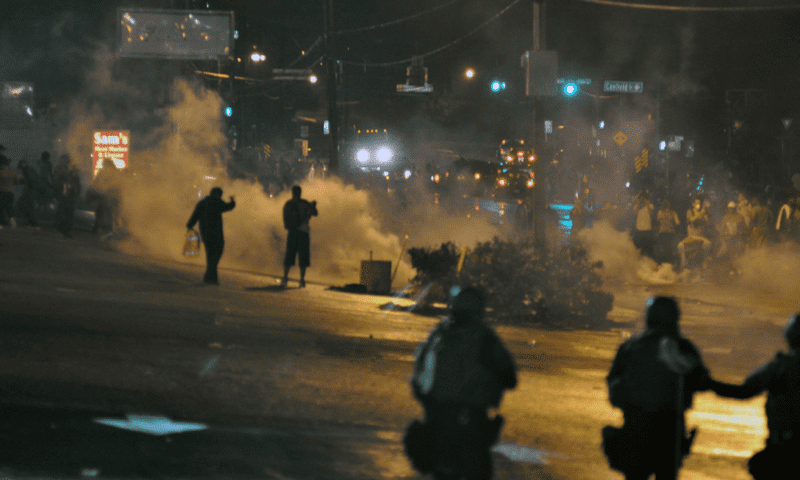
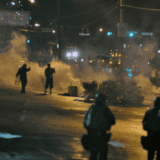
A year and a half ago, I wrote an article for the Huffington Post that I called “Will the Killing of Trayvon Martin Catalyze a Movement Like Emmett Till Did?” I pointed out that Rosa Parks was thinking about Emmett Till — a 14-year-old African American who was brutally murdered by two white thugs in Mississippi in August 1955 — when she refused to move to the back of the bus in December of that year and sparked the Montgomery bus boycott which, in turn, triggered the civil rights movement.
At the time, I hoped the answer to my question would be yes, but I wasn’t sure. I wondered whether the protests over the murder of Trayvon Martin, and the acquittal of his killer George Zimmerman, would coalesce into a sustained movement.
Now we can see that, indeed, a movement for social and racial justice has emerged from the Trayvon Martin murder and more recent events —
» Read more about: The Dawn of a New Racial Justice Movement »


With the expensive mid-term elections followed by Thanksgiving and Black Friday, followed by Cyber Monday, you’d think that people wouldn’t have much money left over for Giving Tuesday. But if current trends continue, charitable contributions this year may actually match pre-Great Recession levels. We won’t know about 2014 for a while, but the results are in for last year: Americans gave $335 billion in nonprofit, tax-deductible gifts in 2013.
The vast majority of that money did not come from rich people. Yes, occasionally a Mark Zuckerberg will give away a billion or so, which certainly ups the total. But on the whole, those in the top 20 percent give away about 1.3 percent of their income while those in the bottom fifth donate about 3.2 percent of their incomes. That’s unfortunate because America’s “ultra-rich” population grew by about six percent last year.
If you’re bummed by the recent election and feel like the clock’s been turned back for women’s rights, take yourself to a screening of She’s Beautiful When She’s Angry, the new documentary on the 1970s women’s liberation movement, and get some righteous feminist energy going.
Opening in Los Angeles December 12 at the Nuart Theater, the 90-minute film is jam-packed with footage of energized women challenging the powers that be — from Congressional committees to the medical establishment, from news media to men on the street — demanding basic rights and respect for themselves as citizens, workers, wives and girlfriends.
As a founder of the Chicago Women’s Liberation Union in the 1960s, I have a small part in the film, which thankfully shows the movement as it really emerged, not just in New York, but in communities across the U.S.
It’s hard to imagine what life was like for women back then – want ads were segregated by gender,
» Read more about: Film Review: “She’s Beautiful When She’s Angry” »
Steve Clemons is Washington editor-at-large for The Atlantic, whose spin-off site, CityLab, covers new ideas and issues facing urban metro areas worldwide. Each year CityLab convenes a gathering of global city leaders in person to discuss innovative ideas and projects that are emerging in urban communities. This year CityLab’s conference was held at the Ace Hotel in downtown Los Angeles. Shortly afterward, Capital & Main spoke to Clemons. In this video clip he speaks of L.A.’s past and its new allure.
Also Watch: Steve Clemons on Government
» Read more about: Steve Clemons on L.A.’s Hard Times and Unbelievably Cool Hybrid Stuff »
Steve Clemons is Washington editor-at-large for The Atlantic, whose spin-off site, CityLab, covers new ideas and issues facing urban metro areas worldwide. Each year CityLab convenes a gathering of global city leaders in person to discuss innovative ideas and projects that are emerging in urban communities. This year CityLab’s conference was held at the Ace Hotel in downtown Los Angeles. Shortly afterward, Capital & Main spoke to Clemons.
» Read more about: Up from Gridlock: The Atlantic’s Steve Clemons on Government »
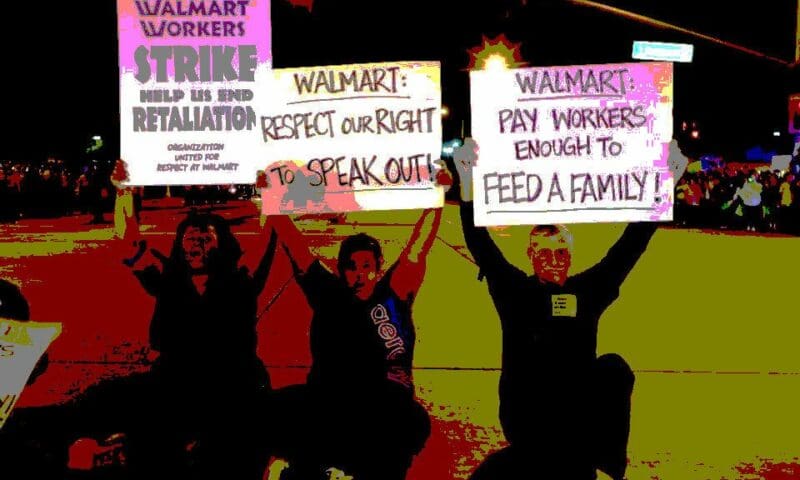

Earlier this month two dozen workers, clergy and other community folks sat down in the aisles of the Walmart store in Pico Riviera, then moved into the streets, where they were promptly arrested. Why would any group of people – much less some not even directly involved in working at Walmart– voluntarily put themselves in a situation they know will lead to their arrest? Because they feel the injustice of minimum wage jobs, whose schedules are unpredictable and deliberately fall just short of offering enough hours to provide health care benefits and paid sick days. These are among other practices that stores like Walmart refuse to rectify.
Without other ways to redress these grievances, people undertake nonviolent civil disobedience. They decide to deliberately break some small law rather than ignore a larger injustice, as Martin Luther King Jr. argued for during the civil rights movement. They break the law, but they are not criminals,


“Hello again,” a familiar female said to Little Joe, who stood ready for flight or fight on the sidewalk. The woman who spoke leaned out of the Escalade’s open rear door. The pearl black vehicle had stopped near him on the street.
He frowned, recognition blossoming. She’d been the one with Teaflake at the burrito joint. He came closer so as to get a better look inside the SUV. “Hello yourself.” There was only her and a bald-headed driver. Well at least it wasn’t Teaflake, he reflected—though it could be one of his enforcers. He remained wary.
“Can I give you a lift?”
“Is this a rubout?” he said, only half-joking.
She laughed heartily. “You’ve been watching too many of those Jimmy Cagney movies.”
The woman was charming and his curiosity was getting the better of his apprehension. What the hell, he concluded. Dressed in slacks and a ribbed top,
» Read more about: The Dixon Family Chronicles: “Esoterica” »


This week California – the state that passed the Three Strikes Law in 1994 – voted 59 to 41 percent in favor of Proposition 47. Proposition 47 will reclassify six non-violent felonies as misdemeanors and redirect the savings in prison spending toward substance abuse treatment, mental health counseling and education.
Is this a movement moment for the long-running campaign to end mass incarceration? There does seem to be a lot of positive activity on the issue. And not just in California.
“Fair Chance Hiring Policies”—also known as “Ban the Box” policies—now cover 70 cities and counties, and 12 states, according to the National Employment Law Project. These policies delay consideration of a person’s conviction history until later in the hiring process, making it easier for those who have felonies on their record to find employment. Big retailers, such as Target, have also banned the box.
» Read more about: What’s Missing from the Movement to End Mass Incarceration? »
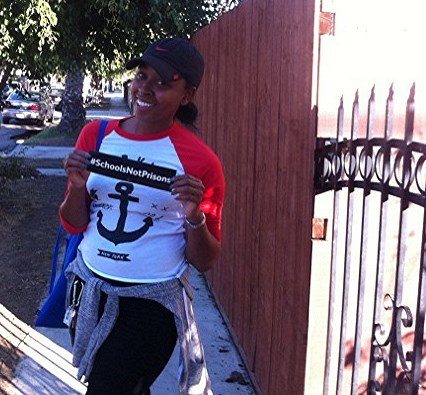

“A lot of people want to make changes but they don’t know where to go,” said Tiesha Speights on the afternoon of Election Day. So Tiesha went to the people, knocking on doors in Long Beach on behalf of Proposition 47, the California ballot initiative written to reduce the penalties for low-level crimes that involve less than $950, from felony levels to misdemeanors. Speights had been hustling block-by-block for the “Yes on 47” campaign for three weeks. Her work and the canvassing efforts of countless others paid off – Prop. 47 would pass handily Tuesday by a 58.5 percent to 41.5 percent margin.
Speights deeply connected with the measure, which permits re-sentencing for those currently serving a prison term for any of the offenses that the initiative reduces to misdemeanors, including forgery, theft, minor drug offenses and shoplifting. Some 10,000 inmates would be eligible to have their sentences reconsidered.
» Read more about: Proposition 47: Winning One Door at a Time »
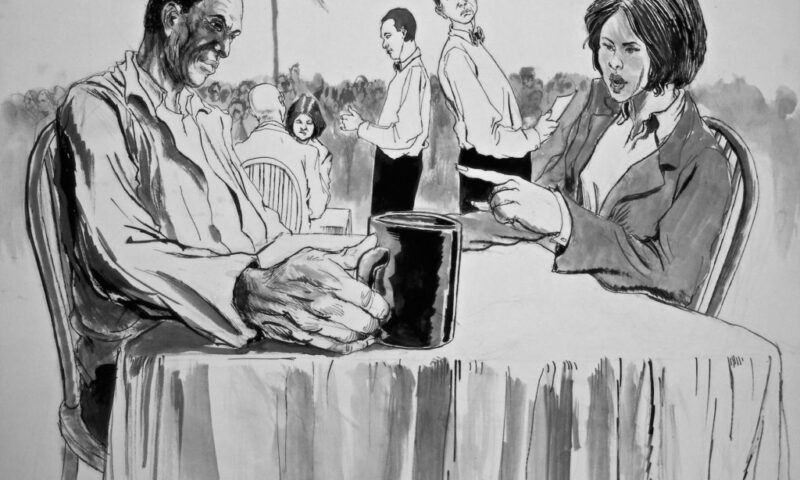
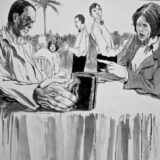
Juanita Evers and Hank Dixon walked into the Mercado La Paloma on Grand at a little past one in the afternoon. The main building had been a garment factory but was now turned into an open space of mom and pop shops. There was one featuring Oaxacan handmade curios, a sports gear seller and various ethnic-style eateries. The place had been developed by a nonprofit.
“How about over there?” Juanita said, pointing to a stall offering Thai food tucked back in a corner of the expanse.
“Okay by me,” Dixon replied. “I could stand some spicy chow.”
They ordered and sat at a nearby table. He said, “You really think the congresswoman can help us?”
“She’s very interested in what the university does and wants it to do right by her constituents.” Juanita was a field deputy for Congresswoman Karen Nelson, whose district included the Eden Arms where Dixon lived.
» Read more about: The Dixon Family Chronicles: “You Gonna Step Up?” »


Night. In this version of the dream, the truck fishtails through the curtain of smoke and flame. Off to the right of her MRAP, the water tanker’s metal skin has split open, sending the liquid treasure everywhere. She watches in stutter shutter clicks as the vehicle’s driver fights to keep that bad boy under control, at the same time zig-zagging past the bombed, burning panel truck.
Corporal Jess Dixon is up top manning the M2 machine gun in the open turret. She swings the weapon about in tight arcs on greased ball bearings, sighting down, wishing for a target as she fires blind. The water tanker hits a slick of burning oil and, brakes screeching, flips, and tons of steel go into a slide. Over her headpiece, not the crackle of her CO, but Whitney Houston singing “It’s Not Right, But It’s Okay.” The armored vehicle clips the tanker, but that ain’t no thing,
» Read more about: The Dixon Family Chronicles: “Early in the Morning” »


Readers of Gary Cohn’s coverage of Proposition 47 and Donald Cohen’s report on the privatizing of America’s jails and prisons will be interested in two events held in sequence this weekend.
Saturday, October 25, 9 a.m.-1 p.m. East Los Angeles College, 1301 Avenida Cesar Chavez, Monterey Park. RSVP here
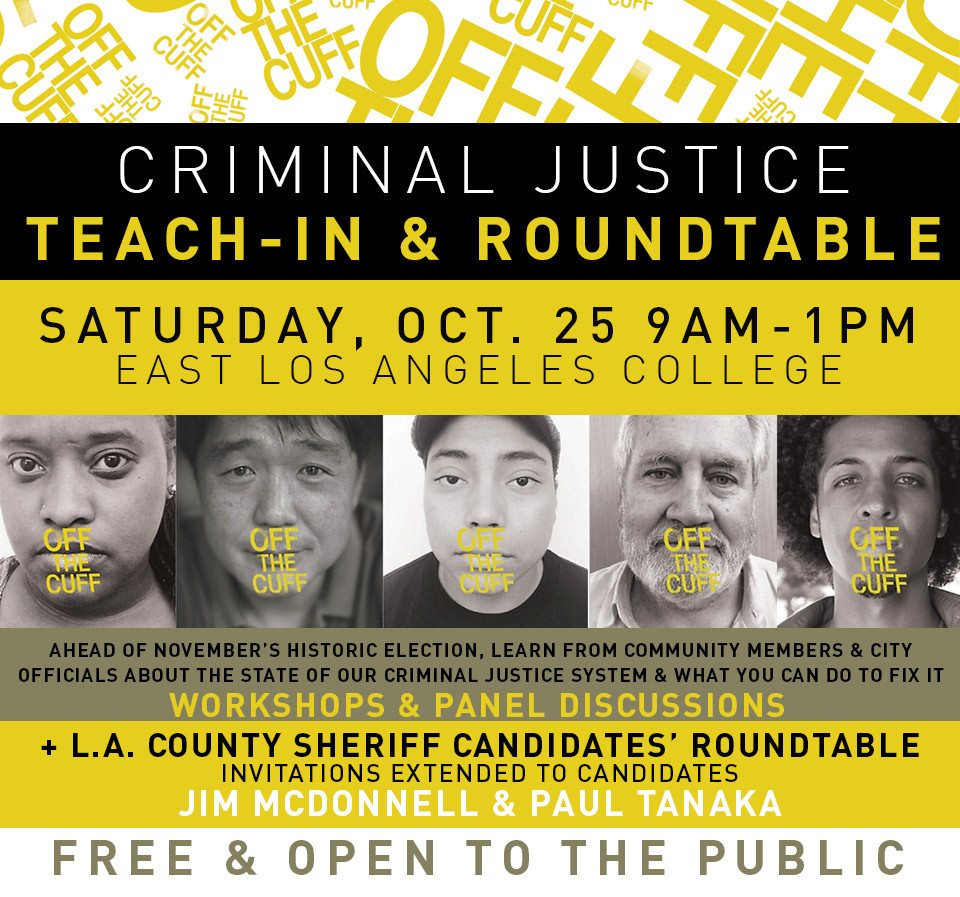


Is the Pope a tease? Not really. He’s trying. He challenged the neoliberal economic system just a month into his papacy and brought up one of its difficult byproducts: growing inequality. And last week, at his recently convened synod on the family, he attempted to coax his bishops to expand their definition of the family, acknowledging yet another difficult issue: the rapidly expanding fact of gay marriage. For a brief moment, it appeared the Church was not only poised to liberalize its definition of the family, but it might even be ready to jumpstart Vatican II and go so far as to overturn one of its most cherished catechisms: denial.
It all started with an October 13 press release that included this hopeful language for LGBT Catholics (the draft was credited to a Pope Francis appointee, Monsignor Bruno Forte, a theologian known for his progressivism):
“Homosexuals have gifts and qualities to offer to the Christian community.
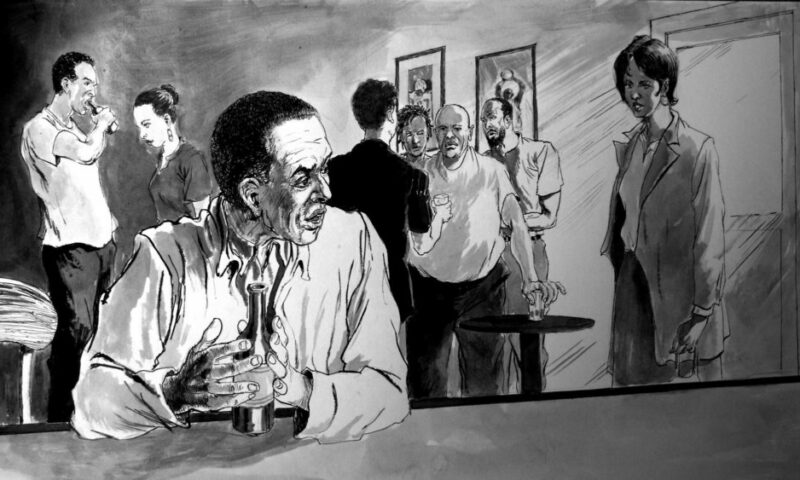
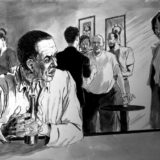
“Son of a . . . ”
Splitting a knuckle open, Jess Dixon grunted through gritted teeth. Working to get the rusted wheel nut loose, it had come undone too fast as she wrenched on the tire iron. Her hand banged onto the edge of the wheel well.
Ignoring the pain, she hurried and got done removing the slashed tire and put the spare on and secured it in place on the hub. The spare was not in good shape, worn smooth on one side, the steel belt underneath just about exposed. She didn’t dig her job but she couldn’t be losing it either.
She got her car going and drove to work, hoping she wouldn’t have a blowout on the lousy tire. Because she got up early each morning, and knew how to change a tire and a few other car repairs from her Uncle Hank showing her,
» Read more about: The Dixon Family Chronicles: “Time Is Tight” »

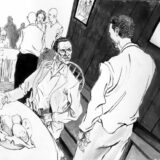
“Am I stutterin’, son?” the green-eyed pleasant-looking man with the perfect teeth said to the tall newcomer standing by his table. Around them the din of the eatery seemed to recede. “There’s no DeMarkus around here.” Like his displeasure, Teaflake made no effort to hide the butt of the Glock sticking out of his waistband.
The young woman sitting with Teaflake smiled understandingly, like she was ushering a patient in for a tooth extraction, Joseph “Little Joe” Dixon reflected.
“Didn’t mean nothing,” he said. “Heard you two was boys is all.” He wasn’t about to back down but wasn’t looking to escalate matters either.
“Who are you?” Teaflake said, his voice low, his enunciation clear and concise, a sharp contrast to the way the usual street hoodlum swallowed vowels and ignored tenses.
Little Joe said, “I’m the new fitness director at Water Stones.” The multi-purpose center was Waterston but everybody called it by its mangled nickname.
Dino Degrassi and Jason Campbell engage in dialogues for a living. They also put the electrical wiring into some of Los Angeles’ largest and most recognizable building projects. Every morning at 6:30 the two electricians ride the street level elevator down into the construction site at Wilshire and Figueroa, where the core of the Wilshire Grand hotel is emerging out of the ground. When finished, the 73-story building will be the tallest west of the Mississippi.
Degrassi is a seasoned journeyman – ostensibly a teacher of apprentices like Campbell who work their way through a five-year program, learning as they go.
Throughout the day, the men’s hard-earned craft knowledge guides their conversation. “I try to help Jason work efficiently,” Degrassi says, as he moves along a cement deck tying in conduit. “I want to make sure he paces himself and doesn’t get hurt.”
“There’s a lot of wisdom to be learned from Dino,
» Read more about: Let’s Talk – Socrates at the Wilshire Grand »